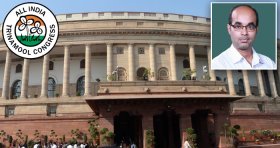April 26, 2016
Dr Tapas Mandal speaks on the Regional Centre for Biotechnology Bill, 2016

Thank you, Sir, for allowing me to speak on the Regional Centre for Biotechnology Bill, 2016. It is a welcome decision by the Government to introduce this Bill. Though we have enough human resources and world-class laboratories, the point is what its contribution in real terms for the development of biotechnology sector is.
It is not that hon. Shri Narendra Modiji started research on biotechnology. Biotechnology is a continuous process. It is a research of long years of glorious past. If we critically examine the history and achievement of bio-technological research in India, our achievement is almost negligible. It is almost zero because there is no significant patent credited to our institutes. They are not filing a number of patents for their credits. There are a lot of institutes. But those institutes are only for giving degrees. They do not have sufficient teaching facilities; they do not have laboratory facilities. There are many private colleges, many institutes across the country. Every year, a lot of students are coming out of these institutes. But what is their contribution in the field of bio-technology? That is my first question to the hon. Minister.
It is not a solution to give national importance to an institute. It is better to strengthen all the institutes uniformly. Most of the time, the Central Government is giving importance to North India or South India. The Eastern part of India is being neglected by almost all the Governments. Please try to set up institutes related to bio-technology in West Bengal because West Bengal is very sound agriculturally. It has higher productivity in agriculture sector. But there is no bio-technology institute related to agriculture in the Eastern part of India. Therefore, I would urge upon the Union Minister to please look into the matter. It is good to give national importance to one Institute. But it is more important to give importance to other institutes also so that we can exclusively go towards the destination where we can satisfy our people.
We can feed our huge population at large. The Regional Centre for Bio-technology was established in 2006 by the Department of Science and Technology under the auspices of UNESCO. It is not an Institute of national importance right now. It is
also not listed among the top ten bio-technology institutes. However, Faridabad is blessed with this Institute where the Central Government paid their attention. In West Bengal, there is an Institute of Chemical Biology. A good quality research work is going on there. But the
Central Government is not taking care of that Institute. So, wherever we have bio-technology institutes in India, please ensure that laboratory facilities, teaching facilities and its quality are looked into. Otherwise, those who are passing out from these Institutes may not be the wealth of the nation; they may be the burden of the nation. Even it is a quick growing industry. The Minister is expecting 30 per cent annual growth in the coming years. But we do not have qualified human resource for these upcoming industries. I would urge the Government to please ensure that.
This institute particularly in Faridabad has some important jobs. One is the pre-term neonatal deaths. In that field they are doing good work. They have a memorandum of understanding with another important institute of Japan. So, some of the important work they have started but they need to establish sub-centres in different States where it is required. And they should develop laboratories in different parts of the country so that they become really a nationally important institute.
Otherwise, if you equip this Faridabad institute and do not look at the other institutes, it will not work. My submission is that an agriculturally sound State like West Bengal may be given due importance in the field of setting up biotechnology institutes. This way you can serve the nation.
The mandate of this centre is to provide a platform for biotechnology education, training and research at the interface of multiple disciplines. The programmes of the centre will be designed to create opportunities for students to engage in a multidisciplinary research where they learn biotech science while integrating engineering, medicine and science to provide solutions for human and animal health, agricultural and environmental technologies.
We have reservations to new innovative sciences and discoveries. Bt Cotton, Bt Brinjal are a simple example of the biotechnology. This is not accepted by a section of society and some are advocating for that.
A uniform decision is not taken by the Government. We do not know.
It is important as to what regulations, what guidelines are to be incorporated. I think personally that regulation in the field of research is not working. Scientists do their work independently. Research should be fundamental and no Government interference should be there. But guidelines should be imposed on a certain section. But Government should take a decision whether biotechnologically engineered crops or genetically modified crops are advocated or not, are advisable to cater to the needs of society or not. That should be decided by the Government. That is my request to the Government. Please look into the matter. Make regulations, make guidelines, but there should be certain limits. You should not interfere with the fundamental research and you should not give instructions to scientists. They independently do their own work. And it is not that this present Government has started research on biotechnology or other sciences.
Nanotechnology is equally important but that is not given due importance.
As biotechnology, the modern science, has a glorious past and a great future, it should be allowed to develop. Simultaneously, there should be one nationally important nanotechnology research centre in India so that we can at least cater to the needs of the coming years of this country.
Thank you.
